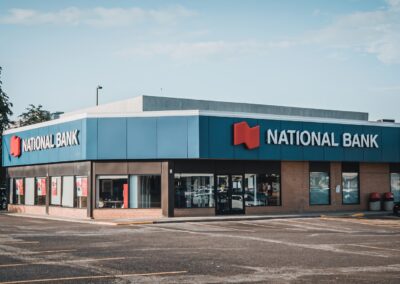Transforming Financial Services with Peer-to-Peer Lending
Fintech Innovation: Empowering Borrowers and Lenders
Fintech in peer-to-peer lending has emerged as a transformative force in the financial industry, revolutionizing the way borrowers and lenders interact. By leveraging advanced technologies, these platforms facilitate direct connections between borrowers and lenders, bypassing traditional banking intermediaries. This innovative approach has gained significant traction in regions like Saudi Arabia and the UAE, where financial inclusion and technological advancements are high priorities.
The rise of fintech-driven peer-to-peer (P2P) lending platforms has democratized access to credit. Borrowers who might have been excluded from traditional banking systems due to stringent requirements or lack of credit history can now secure loans more easily. These platforms use sophisticated algorithms and data analytics to assess creditworthiness, enabling more accurate risk assessment and personalized loan terms. In cities like Riyadh and Dubai, where business innovation thrives, P2P lending is providing new opportunities for entrepreneurs and small businesses to access much-needed capital.
On the other hand, lenders benefit from attractive returns on their investments, often higher than those offered by traditional savings accounts or fixed deposits. By participating in P2P lending, investors can diversify their portfolios and mitigate risks through fractional lending, where their investment is spread across multiple borrowers. This model has proven especially popular in the UAE, where investors are keen to explore alternative investment avenues beyond conventional financial products.
Blockchain Technology: Enhancing Transparency and Security
Blockchain technology plays a pivotal role in enhancing the transparency and security of P2P lending platforms. By utilizing decentralized ledgers, these platforms can ensure that all transactions are immutable and verifiable, reducing the risk of fraud and increasing trust among participants. In the Middle East, where blockchain adoption is accelerating, this technology is a critical component of the fintech landscape.
For instance, smart contracts—self-executing contracts with the terms of the agreement directly written into code—are used to automate loan disbursements and repayments. This automation reduces administrative costs and eliminates the need for intermediaries, making the lending process more efficient. In Riyadh and Dubai, where governments are actively promoting blockchain technology through various initiatives, the integration of blockchain in P2P lending is a natural progression towards a more secure and efficient financial ecosystem.
Furthermore, blockchain’s transparency ensures that all stakeholders have access to the same information, fostering a sense of accountability and reducing disputes. This level of transparency is particularly appealing in regions like Saudi Arabia and the UAE, where regulatory bodies emphasize the importance of robust financial governance and consumer protection. By aligning with these regulatory frameworks, P2P lending platforms can enhance their credibility and attract more users.
Artificial Intelligence: Revolutionizing Credit Scoring and Risk Management
Artificial intelligence (AI) is another cornerstone of fintech in peer-to-peer lending, significantly improving credit scoring and risk management processes. Traditional credit scoring models often rely on limited data points, such as credit history and income levels, which can be insufficient for accurately assessing a borrower’s creditworthiness. AI, however, can analyze a vast array of data, including social media activity, transaction history, and behavioral patterns, to generate more comprehensive and accurate credit scores.
In the dynamic business environments of Riyadh and Dubai, where entrepreneurs and startups frequently seek funding, AI-powered credit scoring can open new avenues for financing. By evaluating non-traditional data points, AI can identify creditworthy individuals who might otherwise be overlooked by conventional banking systems. This inclusive approach aligns with the broader goals of financial inclusion and economic diversification in the Middle East.
Moreover, AI enhances risk management by continuously monitoring and analyzing borrower behavior throughout the loan lifecycle. Predictive analytics can identify potential red flags, such as changes in spending patterns or income disruptions, allowing platforms to take proactive measures to mitigate risks. This real-time monitoring capability ensures that both borrowers and lenders are protected, fostering a sustainable and resilient lending environment.
Strategic Implications for Business Success
Opportunities for Business Growth and Innovation
The integration of fintech in peer-to-peer lending platforms presents substantial opportunities for business growth and innovation. For business executives, mid-level managers, and entrepreneurs, understanding and leveraging these advancements is crucial for staying competitive in the rapidly evolving financial landscape. In Saudi Arabia and the UAE, where economic diversification and technological innovation are key priorities, businesses can benefit immensely from embracing fintech solutions.
Companies that develop or partner with P2P lending platforms can expand their financial service offerings, providing customers with more flexible and accessible financing options. This expansion not only enhances customer satisfaction but also opens new revenue streams. In addition, fintech companies can explore cross-border lending opportunities, capitalizing on the interconnectedness of global markets and the growing demand for international financial services.
Entrepreneurs in the Middle East can also leverage P2P lending to secure funding for their ventures. By bypassing traditional banking constraints, they can access capital more quickly and with fewer bureaucratic hurdles. This agility is particularly valuable in the fast-paced business environments of Riyadh and Dubai, where timely access to funding can be a critical factor in achieving business success.
Leadership and Management in the Fintech Era
Effective leadership and management are essential for navigating the complexities of fintech in peer-to-peer lending. Business leaders must cultivate a deep understanding of the technological, regulatory, and market dynamics that influence the fintech ecosystem. This knowledge enables them to make informed strategic decisions and drive innovation within their organizations.
Leaders should also prioritize building a culture of agility and adaptability. The fintech landscape is characterized by rapid technological advancements and shifting consumer preferences. By fostering a culture that embraces change and encourages continuous learning, businesses can stay ahead of the curve and capitalize on emerging opportunities. In the context of the Middle East, where fintech is a rapidly growing sector, this approach is particularly relevant for maintaining a competitive edge.
Additionally, strong project management skills are crucial for successfully implementing fintech solutions. Projects involving the integration of AI, blockchain, and other advanced technologies require meticulous planning and coordination. Business executives must ensure that their teams have the necessary expertise and resources to execute these projects effectively. In regions like Saudi Arabia and the UAE, where large-scale fintech initiatives are common, effective project management can significantly impact the success of these ventures.
Conclusion: The Future of Fintech and Peer-to-Peer Lending
The role of fintech in peer-to-peer lending is reshaping the financial landscape, offering innovative solutions that empower both borrowers and lenders. By leveraging technologies such as AI and blockchain, these platforms enhance transparency, security, and efficiency, making financial services more accessible and inclusive. In regions like Saudi Arabia and the UAE, where technological adoption and economic diversification are key priorities, the impact of fintech-driven P2P lending is particularly profound.
For business leaders and entrepreneurs, understanding and embracing these advancements is essential for achieving success in the modern financial environment. By fostering a culture of innovation, investing in advanced technologies, and prioritizing effective project management, businesses can thrive in the dynamic fintech landscape. As we move forward, the continued evolution of fintech in peer-to-peer lending will play a pivotal role in shaping the future of finance, driving economic growth, and enhancing financial inclusion.
—
#Fintech #PeerToPeerLending #AIinFinance #Blockchain #SmartLending #FinancialTechnology #SaudiArabia #UAE #Riyadh #Dubai #BusinessSuccess #Leadership #ManagementSkills #ProjectManagement #Innovation























